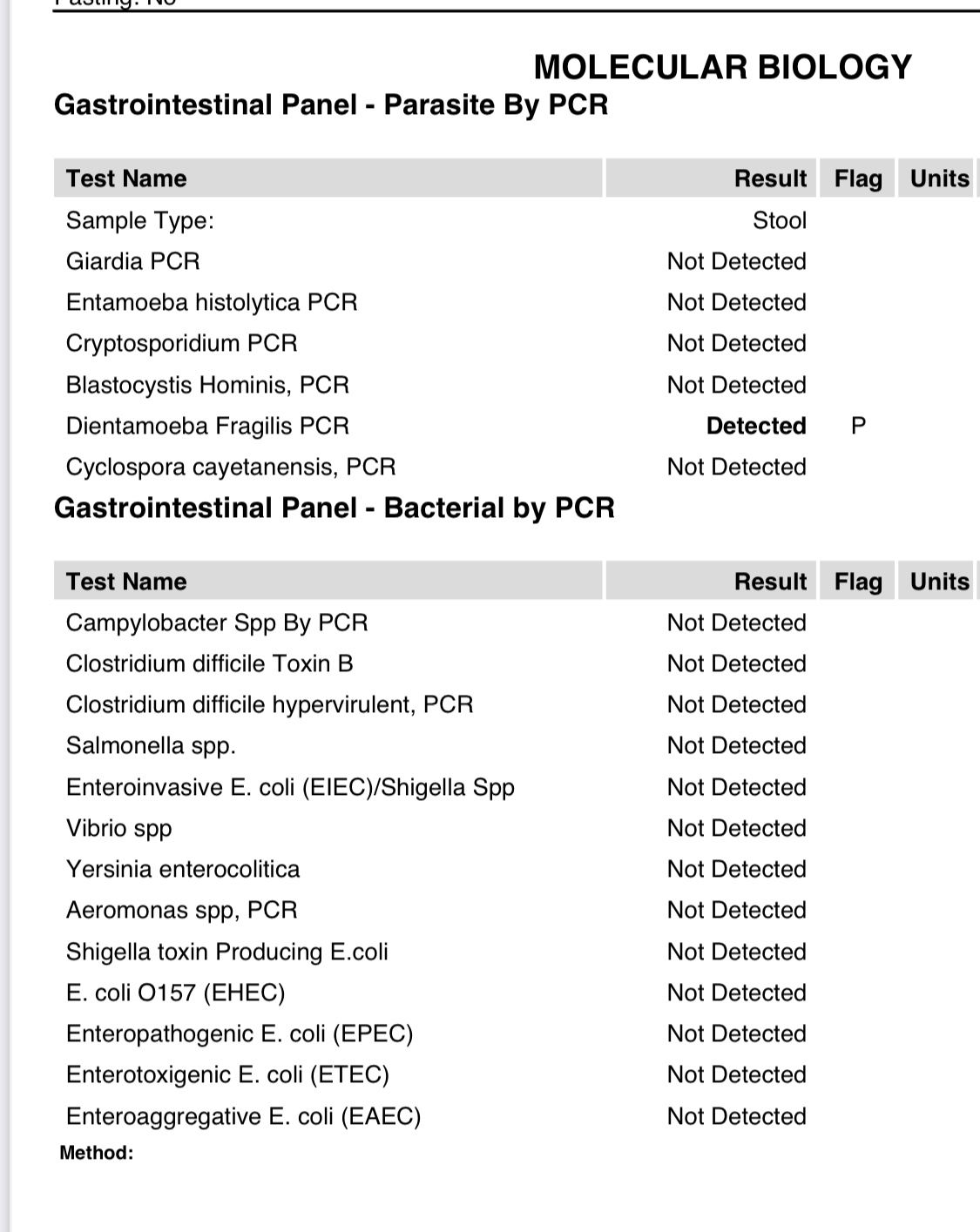BBetter Home Page › Forums › Ask Your Questions › dientamoeba fragilis
-
dientamoeba fragilis
Posted by bartalos_szilvia on December 11, 2022 at 5:43 pmHi,I was just given a positive test for dientamoeba fragilis. The doctor even seeing me again just sent a prescription of metronitazol (antibiotics) without any further consultation.
I started reading about this parasite and I think there may be some other more natural not so gut damaging ways to get rid of them.Would you have some reliable sources where I could read more and come up with a plan to tackle this? I want to give it a go first before I start an antibiotic treatment. I read that it doesn’t guarantee long term solution and it may does more harm than good to my gut.
Also, can I infect my family? ( most worried about my kids of course)
Thank you
Bernadette replied 1 year, 10 months ago 2 Members · 7 Replies -
7 Replies
-
having worked with these protozoa for quite a while, one important note is that they do have life cycles. This is part of what can make them difficult to eradicate, especially when ABx are only used once or twice. Antimicrobials work well when used in a 2- to 4-month timeframe but pulsed. I prefer to use them for 30 days and then 10 days on and 5 days off, scheduling the days “on” around the full moon which seems to create more parasitic activity.
The only thing to consider is while we don’t want the bugs & parasites high, we also don’t fully know their part in the ecosystem of the microbiome.
I try and rely on healing the gut as much as possible and supporting gut immunity so that it can control the level of “bugs” on its own. By knocking a majority of them out at first, and then assisting the body with pulsing the antimicrobials, you can get all the life cycles depleted to a level that is friendlier to the microbiome, without decimating it with antibiotics. As the gut is healing and beneficial bacteria growing, the environment becomes less conducive to allowing the pathogens to flourish.
I share some brands here in the Gut Health Masterclass if you haven’t yet watched it. Regardless of the brand you choose, I typically pair it with Para 1 (or another brand of mimosa pudica) and a binder to help mop-up die off.
Hope this helps give you some additional areas to explore and consider. Let me know if you have any other questions.
-
Thank you so much.. I’ll spend some time this weekend to educate myself.
-
Hi B,
Are pinworms the same as dientamoeba frangilis? So now (while me getting ready with a plan to treat myself) I noticed my daughter had pinworms and tests confirmed.
My question is that whether this is a coincidence, or can be at all related.
She was prescribed vermox syrup which I’m starting for her.
Any special diet I should put her on for getting rid of the worms besides the syrup?
After how long we should retest? How can we avoid this?Thank you
-
I saw your message but my computer decided to die on me before I could reply a few days ago and my iPad isn’t cooperating so my apologies for this 1 big paragraph reply without spacing.
Pinworms and Dientamoeba fragilis are 2 different types of parasites. Pinworms are helminths and DF are protozoa.
Pinworms are very common in children and they spread easily – think of kids playing in sand, putting everything into their mouths, very little concept of personal hygiene (let’s face it, kids are dirty little humans ). Biggest tell-tale sign is an itchy bum, especially at night when they come out of the anus to lay more eggs! (I know it’s gross but it’s all part of the parenthood journey!) You might also see small little worms in their stool.
Mebendazole – the active ingredient in Vermox is effective but take a look at the “other” non-active ingredients added. This has always turned me off… GMO corn starch, hydrogenated vegetable oil, FD&C yellow No.6 more specifically.
Another medication that is effective is Pyrantel Pamoate. Reese’s Pinworm medicine includes that with less “nasties”. https://www.amazon.com/REESES-MEDICINE-PYRANTEL-PAMOATE-SUSPENSION/dp/B01A1C6ET2
These medications are effective and easy; they usually only need 2 doses. Once at the first sign of pinworms and another 2 weeks after.
Also make sure that you’re washing everything often in hot water. Use detergent and vinegar and make sure you and your family are washing your hands often, especially under the nails. You can also apply non-petroleum jelly and rub it on the anus at night to prevent egg-laying and re-infection after kids itch their bums.
During this time, eating probiotic rich foods or taking probiotics is also a good idea to help strengthen gut immunity.
The lifecycle of a pinworm varies from 5 to 13 weeks, so testing can be done after this time to ensure you got them all.
If you prefer the more natural approach, please watch the “anti-parasitics” video in the Gut Health Masterclass for options suitable for children. The natural approach does take longer however.
Hope this helps (and apologies again for this chunk of a reply – I’ll edit it once my PC is back).
-
Thank you so much! And not at all, I just wasn’t sure whether my reply appears without copying in names. Thank you again!
The forum ‘Ask Your Questions’ is closed to new discussions and replies.

